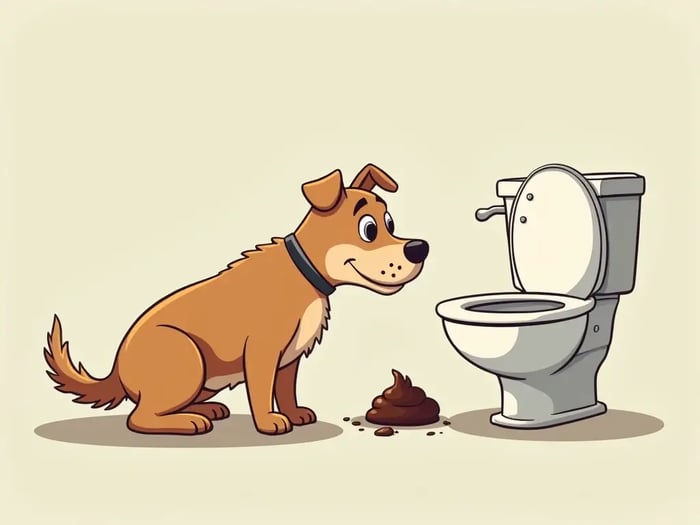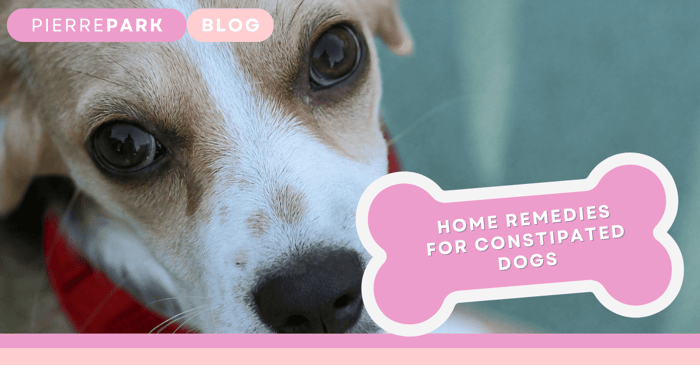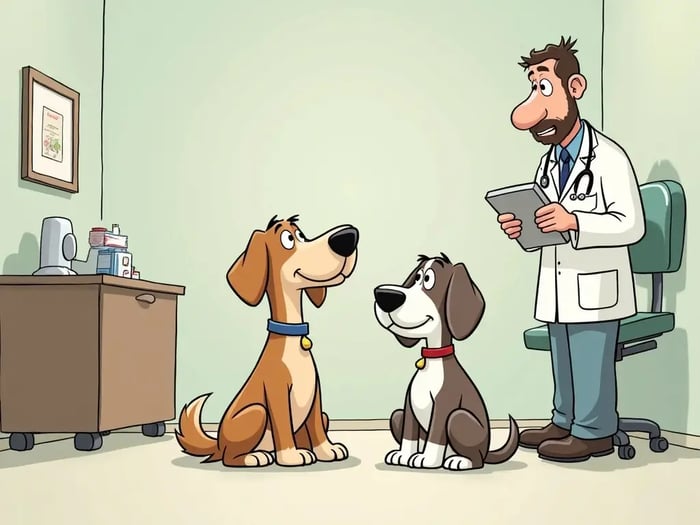Table of Contents
Dog constipation is a common issue that can cause discomfort and concern for pet owners. This article will explore three easy methods to treat dog constipation at home, providing practical solutions to help your furry friend find relief. We'll discuss dietary changes, exercise, and natural remedies that can assist in easing your dog's digestive troubles.
Understanding Dog Constipation
What is dog constipation?
Dog constipation occurs when a canine experiences difficulty or inability to pass stool. This condition can be uncomfortable for your pet and may lead to more serious health issues if left untreated. Constipation in dogs is characterized by infrequent bowel movements, straining during defecation, and the passage of hard, dry stools. It's essential to recognize the signs of constipation early to prevent complications and ensure your dog's digestive system functions properly.
As dogs age, they may become more prone to constipation due to decreased muscle tone in their digestive tract. Older dogs often experience this issue more frequently, making it crucial for pet owners to be vigilant about their dog's bowel movements. Understanding the underlying causes and symptoms of canine constipation can help you address the problem effectively and prevent future occurrences.
What are the common causes of constipation in dogs?
Several factors can contribute to dog constipation, ranging from dietary issues to underlying health conditions. One common cause of constipation is a lack of fiber in the dog's diet, which can lead to harder, drier stools that are difficult to pass. Dehydration is another frequent culprit, as it can cause the colon to absorb too much water from the stool, making it harder and more challenging to eliminate.
Other causes of dog constipation include insufficient exercise, which can slow down digestion, and ingestion of foreign objects like hair or bones that may obstruct the digestive tract. Certain medications, such as opioids or antihistamines, can also cause constipation as a side effect. In some cases, constipation can be a sign of more serious health issues, such as hypothyroidism, kidney disease, or neurological problems. It's crucial to identify the underlying cause to provide appropriate treatment and prevent prolonged constipation.
How can you tell if your dog is constipated?
Recognizing the symptoms of constipation in dogs is crucial for timely intervention. Signs that your dog may be constipated include straining or crying out while attempting to defecate, producing small, hard, and dry stools, or not passing any stool for 24-48 hours. You may also notice your dog showing signs of discomfort, such as a hunched posture, loss of appetite, or lethargy. Some dogs may experience abdominal pain or bloating, which can be evident through their behavior or physical appearance.
If your dog shows signs of constipation, it's important to monitor their bowel movements closely. Keep track of the frequency, consistency, and color of their stools. A constipated dog may pass mucus or blood-tinged stools due to straining. In severe cases, dogs may vomit or refuse to eat. If you suspect your dog is constipated, it's advisable to consult with a veterinarian, especially if the symptoms persist for more than a couple of days or are accompanied by other concerning signs.
Method 1: Dietary Changes
How can you increase fiber in your dog's diet?
Increasing fiber in your dog's diet is an effective way to help regulate bowel movements and prevent constipation. One simple method is to add canned pumpkin to your dog's food. Pumpkin is rich in fiber and can help ease constipation by adding bulk to the stool and promoting regular bowel movements. Start with small amounts, about 1-2 tablespoons per day for medium-sized dogs, and adjust based on your dog's response.
Another way to boost fiber intake is by incorporating fresh vegetables into your dog's meals. Carrots, green beans, and sweet potatoes are excellent sources of fiber that can help your dog's digestive system. You can also consider switching to a high-fiber dog food or adding a fiber supplement specifically formulated for dogs. Always introduce dietary changes gradually to avoid upsetting your dog's stomach, and make sure that your dog has access to plenty of fresh water to complement the increased fiber intake.
What foods can help relieve constipation?
Several foods can help relieve constipation in dogs by promoting healthy digestion and softening stools. Canned dog food, which has higher moisture content than dry kibble, can be beneficial for constipated dogs. The extra moisture helps hydrate the digestive system and makes it easier for your dog to pass stool. Adding a small amount of olive oil or coconut oil to your dog's food can also act as a natural lubricant, aiding in the passage of stool.
Probiotics and fermented foods like plain yogurt can help balance the gut microbiome and improve overall digestive health. Some pet owners find success with natural remedies such as apple cider vinegar, which can be added in small amounts to your dog's water or food. However, it's essential to introduce new foods gradually and in moderation. If your dog's constipation persists or worsens after trying these dietary changes, it's best to consult with a veterinarian for professional advice and to rule out any underlying health issues.
How much water should your dog drink?
Adequate hydration is crucial in preventing and treating constipation in dogs. The amount of water your dog needs depends on various factors, including their size, activity level, and diet. As a general rule, dogs should drink approximately 1 ounce of water per pound of body weight daily. For example, a 50-pound dog should consume about 50 ounces (or 6.25 cups) of water per day. However, this can vary based on individual needs and environmental factors.
To encourage your dog to drink more water, consider providing multiple water bowls throughout your home, using a pet fountain, or adding low-sodium broth to their water. If your dog is on a dry food diet, they may need to drink more water compared to dogs on wet food diets. Always ensure that your dog has access to fresh, clean water, especially during hot weather or after exercise. If you notice your dog is not drinking enough water, it could be a sign of an underlying health issue, and you should consult with your veterinarian.

Method 2: Exercise and Physical Activity
Why is exercise important for preventing constipation?
Exercise plays a crucial role in preventing constipation in dogs by promoting overall digestive health and regular bowel movements. Physical activity helps stimulate the muscles in the intestines, encouraging the movement of waste through the digestive system. This natural stimulation can help regulate your dog's bowel habits and prevent the buildup of hard, dry stools that characterize constipation. Regular exercise also helps maintain a healthy weight, which is important for preventing obesity-related digestive issues.
Moreover, exercise can reduce stress and anxiety in dogs, which are factors that can contribute to constipation. When dogs are active, their bodies release endorphins that promote relaxation and well-being, potentially easing any tension in the digestive tract. Additionally, the increased blood flow during exercise can help improve overall organ function, including that of the digestive system. By incorporating regular physical activity into your dog's routine, you can help prevent constipation and promote better overall health.
What types of exercises are best for constipated dogs?
For dogs experiencing constipation, certain types of exercises can be particularly beneficial in stimulating bowel movements and relieving discomfort. Walking is one of the most effective and accessible forms of exercise for constipated dogs. A brisk walk can help stimulate the digestive system and encourage natural bowel movements. Start with shorter walks and gradually increase the duration as your dog's condition improves. Swimming is another excellent low-impact exercise that can help relieve constipation by providing gentle abdominal massage through water resistance.
Playtime activities such as fetch or tug-of-war can also be beneficial, as they involve movement and mild abdominal engagement. For dogs that enjoy agility training, navigating obstacles can provide a good workout that stimulates various muscle groups, including those in the abdominal area. It's important to tailor the exercise routine to your dog's age, fitness level, and overall health condition. Always start slowly and increase intensity gradually, especially if your dog has been inactive due to constipation. If your dog shows signs of discomfort or fatigue during exercise, stop immediately and consult with your veterinarian.
How often should you exercise your dog?
The frequency of exercise for dogs varies depending on their age, breed, size, and overall health condition. Generally, most dogs benefit from daily exercise to maintain good digestive health and prevent constipation. For adult dogs, aim for at least 30 minutes to an hour of physical activity per day, which can be divided into multiple sessions. Puppies and senior dogs may require shorter, more frequent exercise periods to avoid overexertion while still promoting regular bowel movements.
It's important to establish a consistent exercise routine that fits your dog's needs and your schedule. This could include morning and evening walks, playtime in the yard, or structured activities like agility training. For dogs prone to constipation, consider incorporating short walks after meals to help stimulate digestion. Remember that mental stimulation through interactive toys or training sessions can also contribute to overall well-being and indirectly support digestive health. Always monitor your dog's response to exercise and adjust the frequency and intensity as needed, especially when dealing with constipation or other health issues.
Method 3: Natural Remedies and Supplements
What natural laxatives are safe for dogs?
Several natural laxatives can be safe and effective for treating mild constipation in dogs. One of the most popular and widely recommended options is cooked sweet potato. Sweet potato is rich in fiber and can help regulate bowel movements naturally. Another safe natural laxative is olive oil or coconut oil, which can help lubricate the digestive tract and soften stools. These oils should be given in small amounts, typically no more than one teaspoon per 10 pounds of body weight, mixed into your dog's food.
Aloe vera juice (specifically formulated for pets) can also act as a gentle laxative, helping to soothe the digestive tract and promote regular bowel movements. Some pet owners find success with ground flaxseed or psyllium husk, both of which are high in fiber and can help add bulk to stools. It's important to note that while these natural laxatives are generally safe, they should be introduced gradually and in moderation. Always consult with your veterinarian before adding any new supplements to your dog's diet, especially if your dog has pre-existing health conditions or is taking medications.
How can sweet potato help with constipation?
Sweet potato is an excellent home remedy for dog constipation and can effectively help a constipated dog. As constipation is a common health issue in dogs, it's crucial to understand how this natural remedy can help your pet. Sweet potatoes are high in fiber, which can help soften and soften their stool, making it easier for your dog to get rid of waste.
If you suspect your dog could be constipated, adding sweet potato to their diet is one of the at-home remedies worth trying before taking your dog to the vet. This remedy can be particularly beneficial for dogs with constipation caused by dehydration or lack of fiber.
Before trying any home remedies for constipation, make sure your dog is actually having difficulty pooping. Sweet potato may help relieve your dog's constipation, but it shouldn't replace a vet visit if the problem continues. Check with your veterinarian before adding any new foods or supplements to your dog's diet. Keep in mind that constipation can cause your dog pain, so it's important to address the issue quickly to keep them healthy and comfortable.
Are there any supplements that can aid digestion?
Several supplements can aid digestion and help prevent or alleviate constipation in dogs. Probiotics are beneficial bacteria that support gut health and can help regulate bowel movements. These supplements can be especially useful for dogs with sensitive stomachs or those recovering from digestive issues. Digestive enzymes are another type of supplement that can improve nutrient absorption and overall digestive function, potentially helping to prevent constipation.
Fiber supplements, such as psyllium husk or ground flaxseed, can be added to your dog's diet to increase fiber intake and promote regular bowel movements. Omega-3 fatty acid supplements, typically derived from fish oil, can help reduce inflammation in the digestive tract and support overall gut health. Some pet owners also find success with herbal supplements like slippery elm or marshmallow root, which can soothe the digestive system and help relieve constipation. As with any supplement, it's crucial to consult with your veterinarian before adding them to your dog's regimen to ensure they are appropriate for your pet's specific needs and health condition.
What are the signs of severe constipation?
While mild constipation can often be managed at home, severe constipation requires immediate veterinary attention. Signs of severe constipation in dogs include prolonged inability to defecate (typically more than 48-72 hours), visible discomfort or pain when attempting to pass stool, and straining without producing any feces. You may also notice your dog's abdomen appearing bloated or distended, which can be a sign of impacted feces or an intestinal blockage. Vomiting, loss of appetite, and lethargy are additional signs that indicate the constipation has become more serious.
In severe cases, dogs may pass small amounts of liquid stool or blood-tinged mucus around the hardened feces, a condition known as obstipation. This occurs when the colon becomes so full of dry, hard stool that normal bowel movements are impossible. If you observe any of these symptoms, or if your dog shows signs of intense abdominal pain, weakness, or collapse, it's crucial to seek veterinary care immediately. Severe constipation can lead to serious complications, including dehydration, electrolyte imbalances, and in extreme cases, rupture of the colon.
How long should you wait before consulting a vet?
The decision to consult a veterinarian for dog constipation depends on the severity of symptoms and your dog's overall health. As a general guideline, if your dog hasn't had a bowel movement for 48-72 hours, it's advisable to seek veterinary attention. However, this timeframe can vary based on your dog's normal bowel habits and the presence of other symptoms. If your dog is showing signs of discomfort, straining excessively, or exhibiting any of the severe symptoms mentioned earlier, don't wait – contact your vet immediately.
For dogs with a history of digestive issues or other health conditions, it's best to err on the side of caution and consult your vet sooner rather than later. Additionally, if you've tried home remedies for constipation and haven't seen improvement within 24-48 hours, it's time to seek professional help. Remember that prolonged constipation can lead to more serious health problems, so it's always better to address the issue promptly. Your veterinarian can provide a proper diagnosis and recommend appropriate treatment, which may include prescription medications or other interventions to relieve constipation and prevent future episodes.
What treatments might a veterinarian recommend?
When treating dog constipation, veterinarians have several options at their disposal, depending on the severity and underlying cause of the condition. For mild cases, they may recommend dietary changes, such as increasing fiber intake or switching to a prescription diet formulated for digestive health. They might also suggest increasing water intake or adding moisture to your dog's food. In some cases, veterinarians may prescribe stool softeners or mild laxatives to help your dog pass stool more easily.
For more severe cases of constipation, veterinarians may recommend enemas or manual extraction of impacted feces under sedation. In situations where there's a suspicion of an underlying medical condition causing the constipation, such as hypothyroidism or neurological issues, your vet may order blood tests, x-rays, or other diagnostic procedures to identify and treat the root cause. In rare, extreme cases where conservative treatments have failed, surgery might be necessary to remove severely impacted feces or address any structural abnormalities in the colon. The specific treatment plan will depend on your dog's individual situation, so it's essential to follow your veterinarian's recommendations closely.
Preventing Future Constipation Issues
How can you maintain a healthy diet for your dog?
Maintaining a healthy diet is crucial in preventing future constipation issues in dogs. Start by choosing high-quality dog food that is appropriate for your pet's age, size, and activity level. Look for foods that contain a good balance of protein, fiber, and moisture. If you feed your dog dry kibble, consider mixing in some wet food or adding water to increase moisture content, which can help prevent constipation. Ensure that your dog has access to fresh, clean water at all times to promote proper hydration.
Incorporate fiber-rich foods into your dog's diet, such as pumpkin, sweet potatoes, or green beans, to help regulate bowel movements. However, introduce new foods gradually to avoid digestive upset. Avoid giving your dog table scraps or human foods that may be harmful or disrupt their digestive system. If your dog is prone to constipation, consult with your veterinarian about the potential benefits of probiotic supplements or specialized diets. Remember to monitor your dog's weight and adjust portion sizes accordingly, as obesity can contribute to digestive issues, including constipation.
What lifestyle changes can help prevent constipation?
Implementing certain lifestyle changes can significantly help prevent constipation in dogs. Regular exercise is paramount in maintaining good digestive health. Ensure your dog gets daily physical activity appropriate for their age and fitness level. This can include walks, playtime, or swimming sessions. Exercise helps stimulate bowel movements and promotes overall gastrointestinal health. Additionally, establish a consistent feeding schedule, as regular meal times can help regulate your dog's digestive system and encourage regular bowel movements.
Stress reduction is another important factor in preventing constipation. Create a calm environment for your dog and provide mental stimulation through interactive toys or training sessions. If your dog experiences anxiety or stress during certain situations, such as travel or veterinary visits, work on desensitization techniques or consult with a behaviorist. Regular grooming, especially for long-haired breeds, can help prevent the ingestion of excess hair, which can contribute to constipation. Lastly, ensure your dog has easy access to their preferred bathroom area and maintain a clean environment to encourage regular elimination habits.
How often should you monitor your dog's bowel movements?
Regularly monitoring your dog's bowel movements is an essential part of maintaining their digestive health and preventing constipation. While the frequency of bowel movements can vary depending on factors such as diet, age, and activity level, most adult dogs typically defecate once or twice a day. It's important to establish what's normal for your individual dog and be alert to any changes in frequency, consistency, or color of their stools.
Make it a habit to observe your dog during their bathroom breaks, paying attention to any signs of straining or discomfort. Keep a mental or written record of your dog's bowel movement patterns, including frequency and consistency. This information can be valuable if you need to consult with a veterinarian about digestive issues. If you notice any sudden changes, such as decreased frequency, hardened stools, or difficulty defecating, it's important to address these issues promptly. Early detection of constipation or other digestive problems can lead to quicker resolution and prevent more serious complications.







